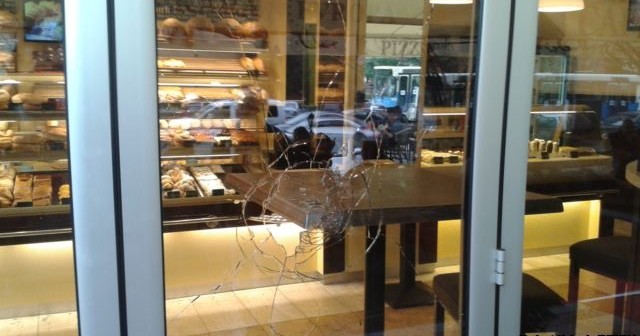Over a year has passed since the nationalist’s assault wave on bakeries in Vojvodina, owners of which were mostly Albanians, and the perpetrators haven’t been apprehended and the suspects remain unpunished. According to the research done by the Vojvodina analyst-research center “Voice” only one case resulted in the issuing of corrective measures, while charges in other cases were either refuted or never reached court.
After the soccer match between Albania and Serbia was interrupted near the end of 2014, several catering facilities, mostly owned by citizens of Albanian descent, were attacked. The targets of the attacks were five businesses in Novi Sad, three in Vrshac as well as those in Stara Pazova, Becej and Sombor. The mosque in Subotica was also attacked
Several days after the attacks Serbia’s minister of internal affairs Nebojsa Stefanovic said that the police has “solved or is well on its way of solving” all the attacks.
According to the research done by the Vojvodina analyst-research center “Voice” in the competent prosecutor’s offices, eighteen months after the attacks five cases were compiled of which one resulted in the issuing of corrective measures, the other in the charges being refuted, preliminary proceedings still underway in the third case while the perpetrators still haven’t been discovered in two cases.
Stipan Kerhani, one of the owners of the “Two brothers” bakery in Sombor that was assaulted with a Molotov cocktail, said for RFE they don’t have any information on potential headways in their case.
“We remained in touch with the police, especially during the rematch game in Tirana. They called us then to tell us that we can count on them and we were safe for a couple of days”, he said.
He added that according to the court surveyor they suffered over 8 million dinars in damages. They received aid from the provincial authorities which covered a part of the costs. He also added that they received support from the townsfolk.
“After our shop was burned down, we raised a stand in front of the facility that we may continue selling our goods. Amidst all the rubble the townsfolk still came to our shop. We don’t have any problems with the community or our neighborhood, none at all, can you believe it?” says Kerhani.
Zeljko Stanetic, director of the Vojvodina Civil Center, said for our program that the lack of stern reaction on the part of the courts will have far-reaching consequences. According to him it is evident there are outside influences on the judiciary with the goal that these cases aren’t resolved in an adequate manner.
“What hasn’t been mentioned in all this time is that this was a hate inspired crime. I think this was presented to the public as mere assault on property. The entire situation could be rationalized by slowness of the courts and the state of the judiciary but I don’t think that is the case here. I believe they are waiting for an opportune time to sweep this issue under the rug and that some manner of influence is being exercised on the courts by interests which don’t want these cases to be solved”, Stanetic says.
Kristina Todorovic, a lawyer with the Lawyers Committee for Human Rights, said for RFE that there is no political will to fight against hate crimes.
“The fact that up to this day there is no condemnatory verdict speaks about the lack of political will to process and sanction criminal offences motivated by hatred due to a real or assumed personal property, which in this particular case is ethnicity. We are of the opinion that Article 54a of the Criminal Code applies to this situation since because these acts have beyond any doubt been motivated by hatred and that article proscribes stricter sanctions in case criminal offences were motivated by hatred”, the expert explains.
Hate crimes were introduces into Serbia’s Criminal Code in 2012. According to the information available to the Committee, this article has yet to be applied to a single case.





